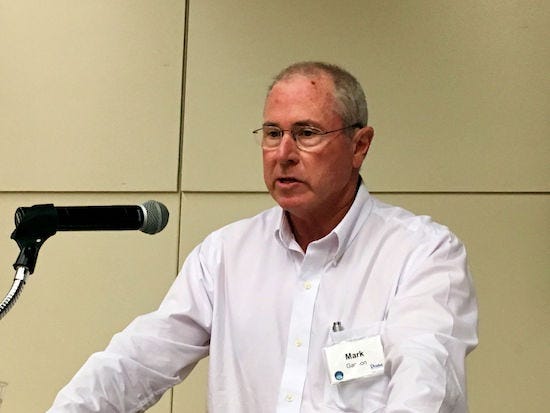
More landowners want to know what you are doing with their asset. How you respond to those questions and concerns could mean the difference between farm expansion and significant land loss.
Some farmers do a great job of sharing information and working as partners with their owners. Many communicate face to face, through newsletters and Facebook, or with tweets and websites.
Sharing information may seem simple. Still, you’d be surprised by how many farmers prefer not to talk with their landowners, says Mark Gannon. He owns and operates Farmland Stewardship Solutions, a farm management consulting service that helps absentee landowners select the right lease, clarify stewardship terms, collect farm-related data and produce annual reports.
 “We just got a large farm to manage, and the main reason was the owner wanted information from the tenant and wasn’t getting it,” says farm manager Mark Gannon. Photo: Mike Wilson
“We just got a large farm to manage, and the main reason was the owner wanted information from the tenant and wasn’t getting it,” says farm manager Mark Gannon. Photo: Mike Wilson

Gannon started the service to help landowners get more information about what’s happening on their land. When more information is shared, trust grows. That trust is crucial when either side wants to negotiate terms of a land lease.
Yet, some still resist.
“Most farmers get it, but don’t want to share because they haven’t had to do it in the past,” he says. “We just got a large farm to manage, and the main reason was the owner wanted information from the tenant and wasn’t getting it. He is hearing more and more the need for this data, even from Extension folks.
“The tenant is disappointed we are getting involved, but it might be good for him in the end as he thinks the rent is too high, and maybe through the data, we might show it is. We can’t figure that out without good information.
“Farmers may be perfectly honest, but if landowners don’t get information they want, they could start to suspect something is wrong,” Gannon says. “Good open communications should build trust for everyone. Sharing more information is a way farmers can show they are doing the right thing in managing their property.”
Of course, some landowners simply want a check and not much more. That’s a different kind of problem, because farmers working in those conditions have few options but to pay up or risk losing the land to someone with deeper pockets.
Feeling dumb
Some landowners, especially two or three generations removed from the farm, don’t understand the lingo and feel self-conscious about asking for explanations. No one wants to feel dumb; it can build resentment.
“Some of the owners ask us to interpret the reports they get from their farmer, to make sure it looks right and help them understand it,” says Gannon.
“A lot of younger operators will bend over backwards to be open,” he adds. “The resistance we see is older operators, maybe on their last few years of farming. They don’t want the hassle, or they think they already have a strong relationship with the landowners.”
Sharing information is one thing, but what if a landowner wants tenants to adopt new farm practices? That depends on the type of practices. Soil health and cover crops are all the rage these days. Are you ready to try certain practices — or explain why you won’t?
Linda Prokopy, Purdue University natural resources professor, says tenants and owners don’t agree on land investments or new practices for many reasons. Tenants may expect owners to share costs; they may resist change because “That’s not how Dad farmed it”; or, high cash rents may mean tenants have little money left over to invest in new practices.
“The annual lease itself is a huge barrier because conservation practices are ongoing,” she says. “Cover crops take several years to pay off.”
Finding common ground is key to any good relationship. Tenants who meet with, share data and understand the goals of their landowners have a better chance of keeping rents reasonable. They may be able to negotiate a long-term lease in exchange for adopting soil health practices. And they may benefit down the road if “word of mouth” in the community is positive.
Don’t fear the data
Gannon says his Farmland Stewardship Solutions service is a new way of managing the relationship between owner and farmer. FSS assists banks and private landowners that may not want a full-blown farm manager, but instead need help to work with a tenant. It’s a lower-priced service that collects farm data and manages the lease.
“We have certain data requirements,” he says. “We help make sure the farm is well maintained, and report at end of year how the lease went, and offer improvement suggestions for next year.”
While that may strike some people the wrong way, sharing that information can benefit the farmer. “Sometimes with the information, we can get the owners to invest in tile or fertilizer. Where before, the operator had trouble communicating with the owner and the owner just thinks they are blowing smoke,” he says. “So there’s a real advantage when you start being open about yields and fertilizer data.”
About the Author(s)
You May Also Like






